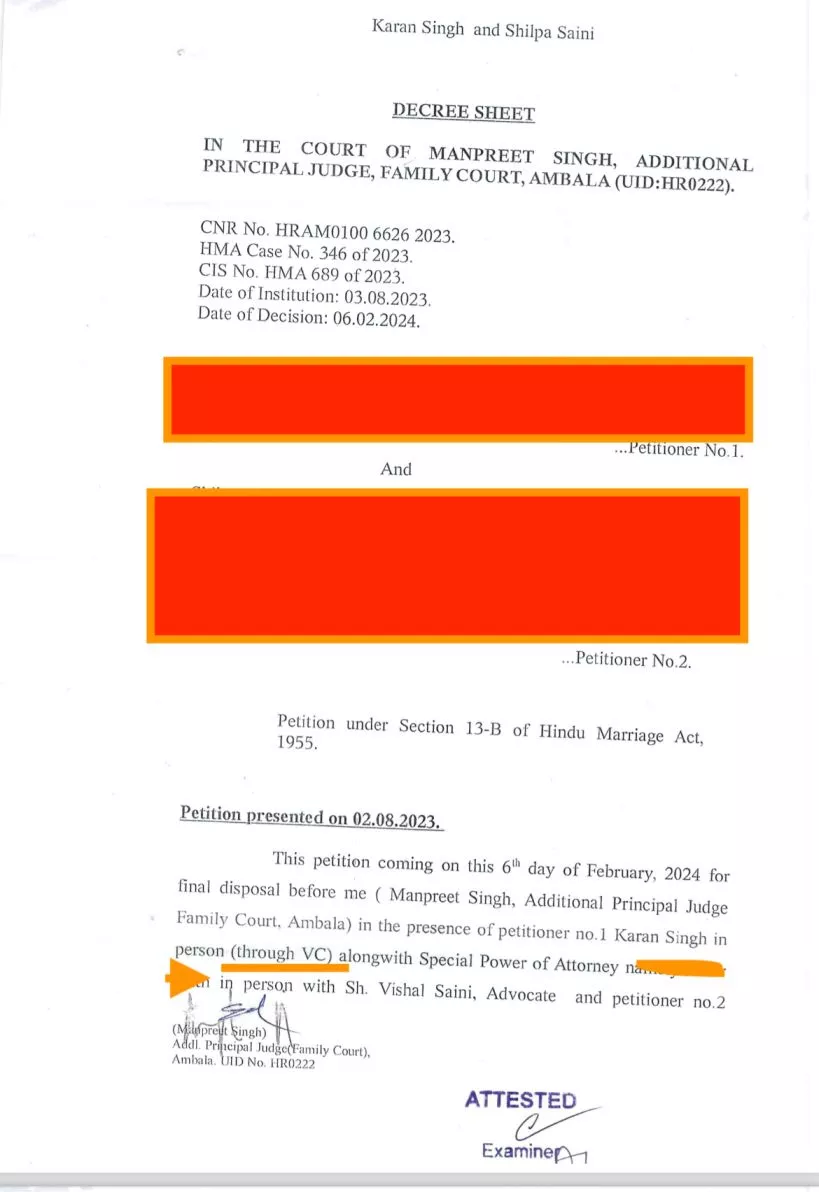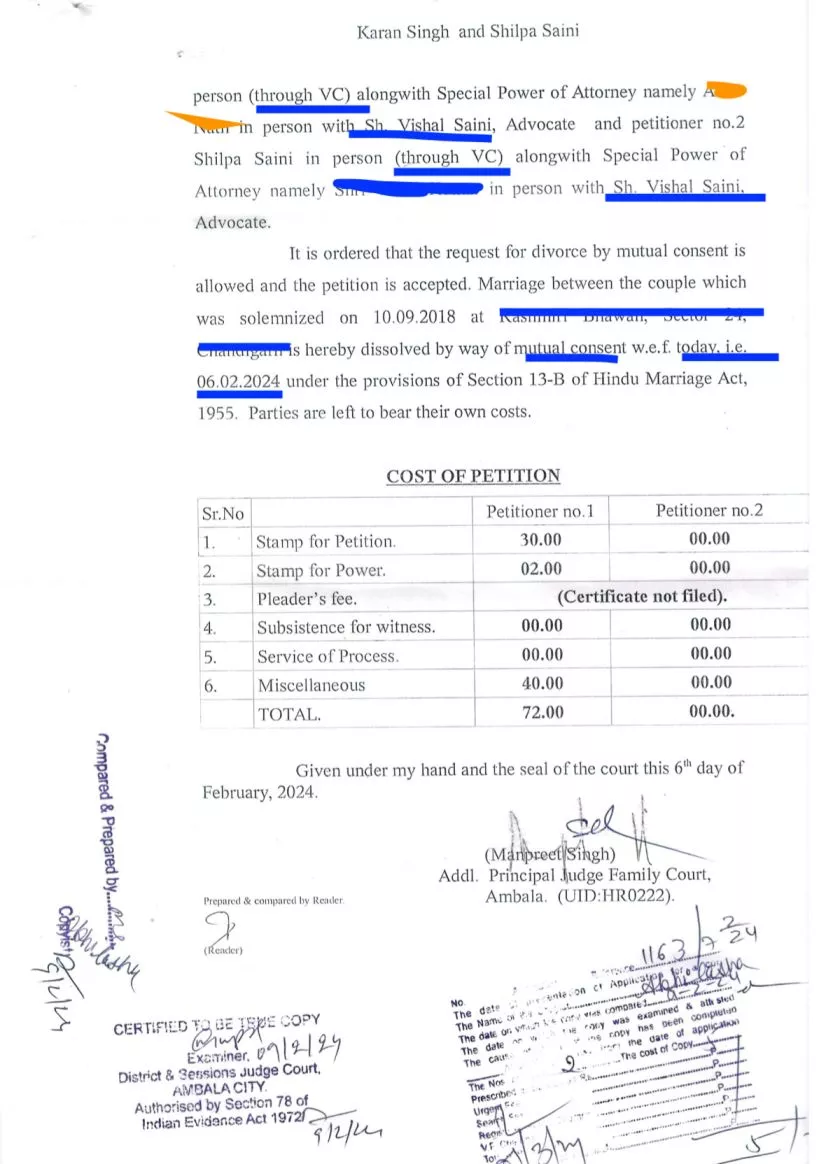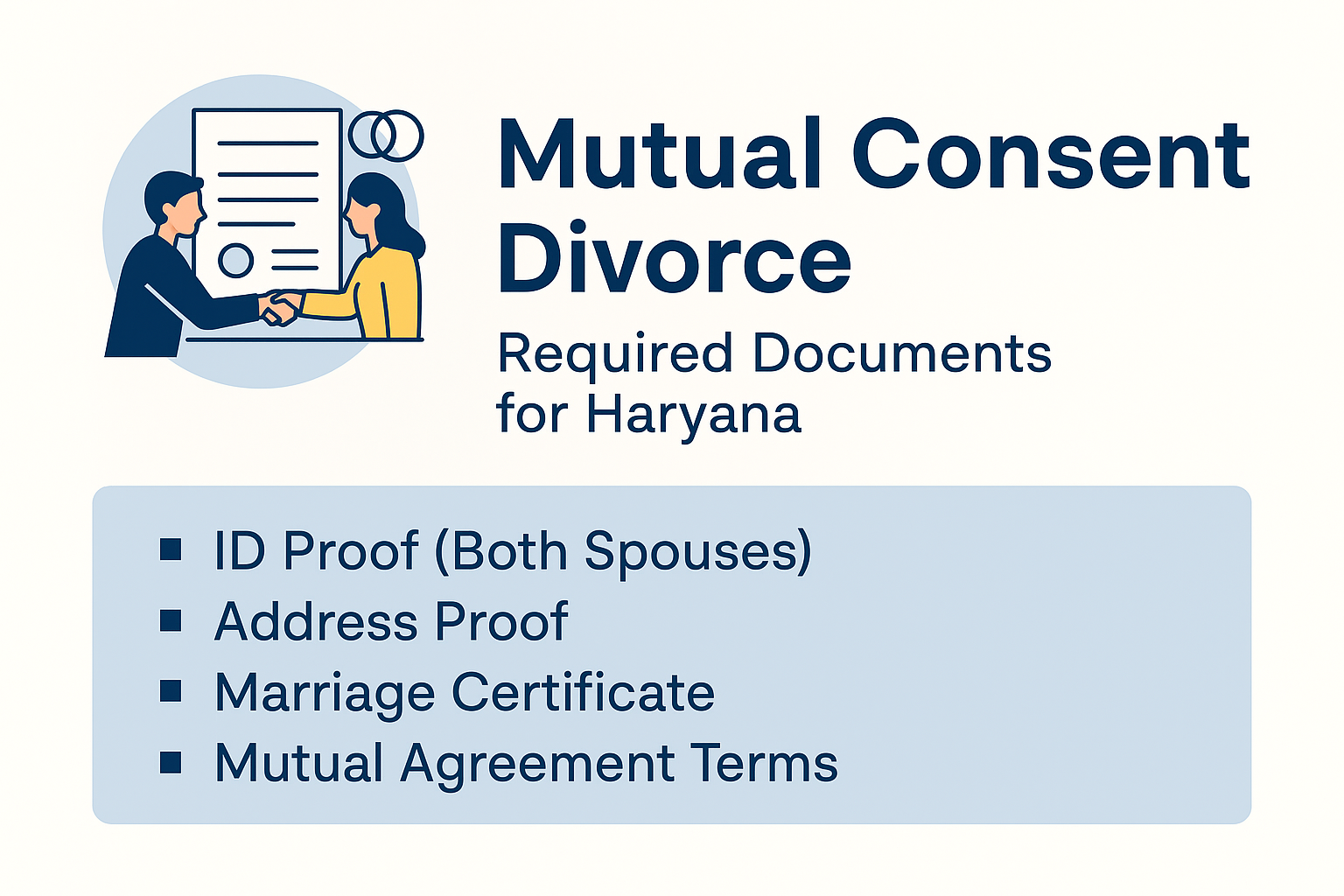🏠 Introduction
Getting a divorce while living abroad can feel overwhelming. But NRIs (Non-Resident Indians) can easily manage a divorce in Haryana by following the proper legal process. This guide simplifies the mutual consent and contested divorce procedures, explains how to use a Special Power of Attorney, and provides court contacts — all in a clear and easy-to-follow format.
✅ Quick Overview Table
| Topic | Mutual Consent Divorce | Contested Divorce |
|---|---|---|
| Agreement | Both spouses agree | One spouse disagrees |
| Duration | 6 months | 1 to 3 years or more |
| Court Hearings | 2 main hearings | Multiple hearings |
| Complexity | Simple | Complex |
| Lawyer Required | Yes | Yes |
| NRI Physical Presence | Not necessary (can use video conferencing/POA) | Not necessary (can use video conferencing/POA) |
| Cost | Comparative Lower | Higher |
🔎 Jurisdiction: Where to File in Haryana?
- Place of marriage (e.g., Panipat, Gurugram)
- Last matrimonial home
- Where the spouse currently resides in Haryana
Tip: Consult your lawyer to confirm the right family court district.
NRI Divorce Filing Process in Haryana: Complete Guide
📝 Divorce Options for NRIs
1️⃣ Mutual Consent Divorce (Most Recommended)
📊 Flowchart: Mutual Consent Divorce (NRI)
[Separation 1 year]
↓
[Joint Petition Filed]
↓
[First Motion Hearing] → [Video Conferencing Allowed]
↓
[Cooling-Off Period] → [May Be Waived]
↓
[Second Motion Hearing]
↓
[Decree of Divorce]
Legal Provision: Section 13B, Hindu Marriage Act / Section 28, Special Marriage Act
Requirements:
- Living apart for 1 year or more
- Agreement on alimony, property, and child custody
Steps:
- Draft and file a joint petition (or through Special POA)
- First motion hearing (can be attended via video conference)
- Cooling-off period (6 months) — can be waived in some cases
- Second motion hearing
- Decree of divorce granted
Timeframe: Usually 6 months
📄 How a Mutual Consent Divorce Order Looks When Done Through Video Conferencing (VC)
Below is a real example of a divorce decree granted by a Haryana Family Court where both spouses (NRIs) completed the process through video conferencing, using a Special Power of Attorney (SPA) for filings and virtual appearances.


2️⃣ Contested Divorce
📊 Flowchart: Contested Divorce (NRI)
[Petition Filed by NRI]
↓
[Notice to Spouse]
↓
[Written Reply Filed]
↓
[Mediation Attempt] → [Fail/Success]
↓
[Evidence Stage (POA or Video Testimony)]
↓
[Final Arguments]
↓
[Decree of Divorce]
Legal Provision: Section 13, Hindu Marriage Act (or applicable personal law)
Common Grounds:
- Cruelty
- Desertion (2+ years)
- Adultery
- Conversion
- Mental illness
- Not heard alive for 7 years
Steps:
- File a divorce petition
- Court issues summons to spouse
- Written statement by spouse
- Mediation attempt
- Trial & evidence stage
- Final arguments & decree
Timeframe: 1 to 3+ years
📑 Documents Checklist
| Document | Purpose |
|---|---|
| Marriage Certificate | Proof of marriage |
| Marriage photos & invitation card | Supplementary proof |
| ID Proofs (Passport/Aadhaar) | Identification |
| Address Proofs | Establish jurisdiction |
| Separation Proof | Affidavit or declaration |
| Mutual Consent Petition | Lawyer drafts |
| Special Power of Attorney (POA) | If NRI cannot attend |
| Evidence (for contested cases) | Medical records, emails, etc. |
🔍 Power of Attorney (POA) — How it Works
Purpose: Authorizes a trusted person to represent you in court.
Process:
- Draft a Special Power of Attorney (for divorce only)
- Notarize & get it attested at Indian Embassy/Consulate
- Courier to India
- Submit in court
Note: POA cannot give personal testimony. You may need to give statements via video conferencing.
📈 Average Time Comparison
| Divorce Type | Minimum Duration | Average Duration |
|---|---|---|
| Mutual Consent | 6 months | 6-12 months |
| Contested | 1 year | 2-3 years |
💡 5 Practical Tips for NRIs
- Hire an experienced family lawyer in Haryana.
- Use a Power of Attorney for court representation.
- Request video conferencing for hearings.
- Keep all documents scanned and ready.
- Try mutual consent to save time and money.
🔎 30 FAQs — NRI Divorce Filing Process in Haryana
General Process & Jurisdiction
1️⃣ Can an NRI file for divorce in Haryana while living abroad?
Yes. You can file through a lawyer and use a Special Power of Attorney (SPA) for court proceedings.
2️⃣ Is personal presence required for NRI divorce cases?
Usually not. Video conferencing or an SPA holder can handle most steps. You may need to appear virtually for important testimony.
3️⃣ Which court has jurisdiction over my divorce case in Haryana?
Typically, the family court where the marriage occurred, where you last lived together, or where your spouse currently resides.
4️⃣ Can I choose any district in Haryana to file for divorce?
No. You must file in the district court that has legal jurisdiction based on your marriage or residence history.
5️⃣ What laws apply to NRI divorces?
Indian personal laws like the Hindu Marriage Act, Special Marriage Act, or other applicable religious or civil laws.
Mutual Consent Divorce
6️⃣ What are the requirements for mutual consent divorce?
Both spouses must agree to divorce and have lived apart for at least one year.
7️⃣ Can the 6-month waiting period be waived in mutual divorce?
Yes. Courts may waive it if the separation is long-standing and reconciliation is impossible.
8️⃣ Is mutual consent divorce faster than contested divorce?
Yes. Mutual consent typically takes 6 to 12 months, sometimes less if the cooling-off period is waived.
9️⃣ Do both spouses have to be in India for mutual divorce?
No. Either spouse can appear via video conferencing or authorize an SPA holder.
10️⃣ Can child custody be settled during mutual consent divorce?
Yes. Child custody, support, and property matters can be included in the divorce settlement.
Contested Divorce
11️⃣ What grounds can I use to file a contested divorce?
Cruelty, desertion (2+ years), adultery, conversion, mental illness, and others recognized by law.
12️⃣ Can I file contested divorce if my spouse refuses to agree?
Yes. You can file on valid legal grounds even without your spouse’s consent.
13️⃣ How long does a contested divorce usually take?
Anywhere from 1 to 3 years, depending on complexity and court schedule.
14️⃣ Will I need to attend every hearing in a contested divorce?
No. Your lawyer or SPA holder can attend procedural hearings. You may need to attend key evidence or testimony hearings via video or in person.
15️⃣ Can a contested divorce be converted to mutual consent later?
Yes. If both spouses agree during the case, it can be switched to mutual consent to speed up the process.
Special Power of Attorney & Video Conferencing
16️⃣ What is a Special Power of Attorney (SPA) in divorce cases?
It authorizes a trusted person to represent you in court for procedural matters, like filing petitions and attending hearings.
17️⃣ Can my SPA holder testify on my behalf?
No. Personal testimonies must be given by you, usually via video conferencing if abroad.
18️⃣ Is video conferencing allowed for NRI divorce hearings?
Yes. Most family courts in Haryana allow virtual appearances for NRIs.
19️⃣ How do I notarize an SPA if I’m abroad?
Sign the SPA before a notary and get it attested by the Indian Embassy or Consulate.
20️⃣ Can I change my SPA holder during the case?
Yes. A new SPA can be issued if needed, following the same attestation process.
Documents & Legal Technicalities
21️⃣ What are the essential documents for filing divorce?
Marriage certificate, ID proofs, address proofs, photographs, and any evidence (if contested).
22️⃣ Do I need to translate foreign marriage certificates?
Yes, if the certificate is not in English, provide a certified translation.
23️⃣ Will Indian courts recognize my foreign marriage certificate?
Yes, provided it is valid and legally recognized in the country where it was issued.
24️⃣ Can foreign divorce decrees be enforced in India?
Yes, if they meet the criteria under Section 13 of the CPC (proper jurisdiction, fair process, etc.).
25️⃣ Do I need to hire a lawyer for an NRI divorce?
Highly recommended. Managing court filings, evidence, and procedural steps requires professional legal assistance.
Timelines, Costs & Strategy
26️⃣ Is mutual divorce always quicker than contested?
Yes. Mutual consent is almost always faster and less expensive.
27️⃣ How can I speed up my divorce process?
Opt for mutual consent, use video conferencing, provide clear documents, and maintain communication with your lawyer.
28️⃣ Are there extra court fees for NRIs?
No special NRI fees, but international document couriering, SPA notarization, and lawyer fees apply.
29️⃣ What if my spouse lives in another country too?
The court can serve summons internationally or allow both parties to appear via video conferencing.
30️⃣ What’s the biggest mistake NRIs make in divorce cases?
Delaying legal action or ignoring summons. Staying proactive and hiring a knowledgeable lawyer is key.
✅ Pro Tip: A correctly executed Special Power of Attorney and clear communication with your Haryana-based lawyer can help NRIs avoid unnecessary delays.













